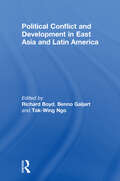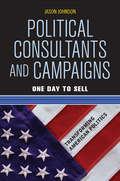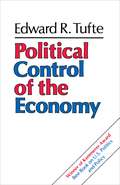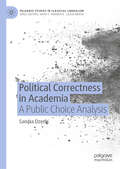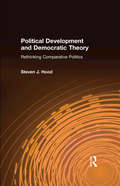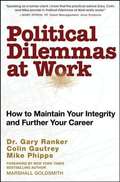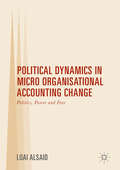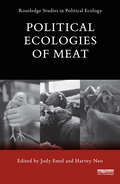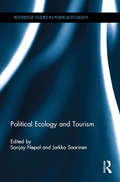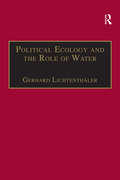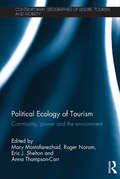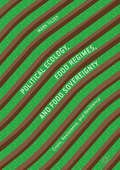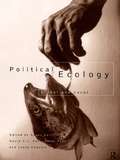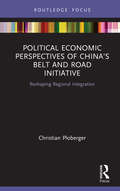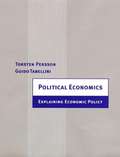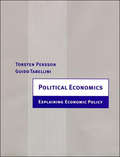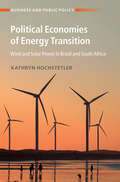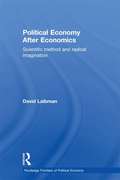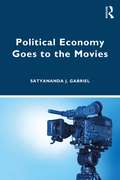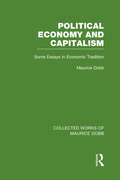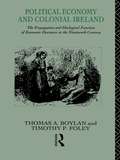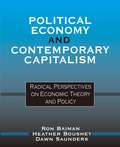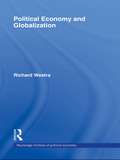- Table View
- List View
Political Conflict and Development in East Asia and Latin America
by Richard Boyd Tak-Wing Ngo Galjart BennoLong run processes of socio-economic change generate prodigious problems of social conflict and social control, and governments responsible for these processes must therefore manage the resultant conflict. Consequently, the success or failure of a government's management of such conflicts is a crucial factor in development outcomes. This volume investigates the political struggle for development specifically in two vital regions - East Asia and Latin America. This analysis calls into question the dominant emphasis on institutional and cultural bases for stable growth. A careful historical account of the two regions is presented, which permits the rigorous testing of conventional wisdoms regarding development. Of importance to a broad range of academics in the spheres of development studies, politics, political economy and sociology, this book will also make an interesting read for those with a general interest in these areas.
Political Consultants and Campaigns
by Jason JohnsonPolitical Consultants and Campaigns: One Day to Sell examines the differences between how political science theory suggests campaigns should be run and how political consultants actually run campaigns. In the wake of consultants who effortlessly move from campaigners to policymakers, the dearth of knowledge about the attitudes, beliefs, and strategies of the consultants themselves is still a glaring absence in the analysis of American politics. How can we purport to know what is happening in American political campaigns if we don't know what is on the minds of the men and women who run them? This book provides a clearer understanding of modern-day political campaigns by revealing what is on the minds of the people who run them. With original data from consultants, campaign managers, and professional campaign schools, author Jason Johnson examines consultant behavior on message formation, policy positioning, candidate recruitment, Internet strategy, and negative advertising and compares these practices to existing political science theory. This groundbreaking research makes Political Consultants and Campaigns: One Day to Sell a must-have resource for all students of American politics, campaign managers, or anyone interested in how political campaigns in America are run.
Political Consumerism
by Dietlind Stolle Michele MichelettiShoppers can express their values as they search for value. Political consumerism is turning the market into a site for politics and ethics, as consumer choices reflect personal attitudes and purchases are informed by ethical or political assessment of business and government practice. In such forms as boycotts, when consumers refuse to buy, or buycotts, where consumers shift their purchases, the ostensibly apolitical marketplace is a site of contestation at the intersection of globalization and individualization. This book opens readers' eyes to a new way of viewing everyday consumer choices and the role of the market in our lives, illuminating the broader theoretical and historical context of concerns about sweatshops, responsible coffee, and ethical and free trade.
Political Control of the Economy
by Edward R. TufteSpeculations about the effects of politics on economic life have a long and vital tradition, but few efforts have been made to determine the precise relationship between them. Edward Tufte, a political scientist who covered the 1976 Presidential election for Newsweek, seeks to do just that. His sharp analyses and astute observations lead to an eye-opening view of the impact of political life on the national economy of America and other capitalist democracies.The analysis demonstrates how politicians, political parties, and voters decide who gets what, when, and how in the economic arena. A nation's politics, it is argued, shape the most important aspects of economic life--inflation, unemployment, income redistribution, the growth of government, and the extent of central economic control. Both statistical data and case studies (based on interviews and Presidential documents) are brought to bear on four topics. They are: 1) the political manipulation of the economy in election years, 2) the new international electoral-economic cycle, 3) the decisive role of political leaders and parties in shaping macroeconomic outcomes, and 4) the response of the electorate to changing economic conditions. Finally, the book clarifies a central question in political economy: How can national economic policy be conducted in both a democratic and a competent fashion?
Political Correctness in Academia: A Public Choice Analysis (Palgrave Studies in Classical Liberalism)
by Sandra DzenisThis book explores the phenomenon of political correctness in academia and explains why and how scholars and administrators impact PC&’s prominence in the academic sphere. To do so, it examines the actions of these agents through the lens of public choice theory, revealing how self-interested strategies drive the policies and norms of the university. The book examines the ideological dimensions of political correctness and highlights four key spheres of influence – academic research, higher education curricula, affirmative action and speech codes. The book offers a nuanced exploration of how PC and liberalism have common ground. It demonstrates how the liberal values of equality and individual liberty largely underpin PC, whose regulatory function is to protect a liberal value system from illiberal truth claims. Yet the book also shows how interest groups form around the concept of PC in universities and have successfully used systems of rent-seeking and collective action to shape institutional policy and protect their members from ideological and professional competition, which can be seen as a violation of classical liberal principles of fair competition and equal opportunity. This book is a valuable tool for researchers working in political economy and PPE (politics, philosophy and economics), as well as those interested in the political economy of academia and the concept of PC more generally.
Political Development and Democratic Theory: Rethinking Comparative Politics
by Steven J. HoodMost comparativists have assumed that democratization is best understood by looking at regimes in the transition and consolidation phases of democracy without really considering the essence of democracy - liberal rights and democratic virtues. Democracy is seen as a mechanistic process without considering the ideas that build democratic regimes. This book begins afresh by proposing that comparativists need to consider democracy to be a combination of rights and virtues, and that the difficulties of democratic transitions, consolidation, and maintenance are essentially problems relating to balancing rights and virtues in the regime. How do we reemphasize these aspects of democracy at a time when comparative literature focuses almost solely on democratic procedure? By combining the best elements of comparative theory and liberal democratic philosophy, Hood argues that comparativists can sharpen the scholarly tools we need to understand both the problems of democratization and maintaining democracy. He provides the reader with a valuable overview of comparative theory and how our abandonment of political philosophy has led to our acceptance of social science methods that can only lead to superficial analyses of democratizing regimes and established democracies.
Political Dilemmas at Work
by Colin Gautrey Mike Phipps Gary RankerMike Phipps and Colin Gautrey's first book, 21 Dirty Tricks at Work, presented the most common political tactics used by individuals in the workplace. This book helped many people around the world handle these tactics in a constructive and assertive manner. What was not tackled were the more strategic political situations that people find themselves in when others exert their power and influence, the type of political campaigns that can leave individuals feeling bemused, fearful and paralyzed. Political Dilemmas at Work will present real political challenges in an original and engaging way - which will be instantly recognizable by any experienced manager. Then, based on the authors' experience of coaching managers and directors, they will offer analysis and practical tools and tips about how to deal effectively in these situations. With the workplace becoming more political and competitive by the day, Political Dilemmas at Work will come to the rescue. This book will become required reading for anyone who is ambitious and wants to ensure that they do not fall foul of negative organizational politics.
Political Dynamics in Micro Organisational Accounting Change
by Loai AlsaidThis book explores the role of politics in cost accounting change. Empirical research sheds new light on how the macro-political dynamics of the state can underpin micro-level changes in an organisation's cost management practices. Taking an Egyptian state-owned enterprise as its case study, chapters explore the political evolution of these practices and how they became a political and consequently strategic imperative. The author examines the roles played by neoliberal political reform, re-privatisation, modernisation and state budget reform in relation to micro level changes in cost management practices. Readers are invited to learn about the public sector cost management practices and the changes that have taken place in various political, cultural, economic, and organisational settings.
Political Ecologies of Meat (Routledge Studies in Political Ecology)
by Harvey Neo Jody EmelLivestock production worldwide is increasing rapidly, in part due to economic growth and demand for meat in industrializing countries. Yet there are many concerns about the sustainability of increased meat production and consumption, from perspectives including human health, animal welfare, climate change and environmental pollution. This book tackles the key issues of contemporary meat production and consumption through a lens of political ecology, which emphasizes the power relations producing particular social, economic and cultural interactions with non-human nature. Three main topics are addressed: the political ecology of global livestock production trends; changes in production systems around the world and their implications for environmental justice; and existing and emerging governance strategies for meat production and consumption systems and their implications. Case studies of different systems at varying scales are included, drawn from Asia, Africa, the Americas and Europe. The book includes an editorial introduction to set the context and synthesize key messages for the reader.
Political Ecology and Tourism (Routledge Studies in Political Ecology)
by Jarkko Saarinen Sanjay NepalPolitical ecology explicitly addresses the relations between the social and the natural, arguing that social and environmental conditions are deeply and inextricably linked. Its emphasis on the material state of nature as the outcome of political processes, as well as the construction and understanding of nature itself as political is greatly relevant to tourism. Very few tourism scholars have used political ecology as a lens to examine tourism-centric natural resource management issues. This book brings together experts in the field, with a foreword from Piers Blaikie, to provide a global exploration of the application of political ecology to tourism. It addresses the underlying issues of power, ownership, and policies that determine the ways in which tourism development decisions are made and implemented. Furthermore, contributions document the complex array of relationships between tourism stakeholders, including indigenous communities, and multiple scales of potential conflicts and compromises. This groundbreaking book covers 15 contributions organized around four cross-cutting themes of communities and livelihoods; class, representation, and power; dispossession and displacement; and, environmental justice and community empowerment. This book will be of great interest to students and scholars in tourism, geography, anthropology, sociology, environmental studies, and natural resources management.
Political Ecology and the Role of Water: Environment, Society and Economy in Northern Yemen (King's SOAS Studies in Development Geography)
by Gerhard LichtenthälerHow can we explain the over-exploitation and degradation of natural resources in the countries of the South? Population growth, poverty and problems associated with common property resource management have been common themes in this debate, yet insufficient attention has been paid to how traditional political relations and local perceptions affect natural resource capture and resource allocation. This is especially evident with respect to groups and communities at the political and geographical peripheries of state influence and control for whom self-identity is constructed around notions of autonomy and food self-sufficiency. This informative book addresses this omission by discussing water resource allocation and management. It focuses in particular on the socio-economic and political contexts which influence approaches to and determine practices of water management. Taking the example of the tribal communities of the Sa’dah basin in the northern Yemen, it analyzes the politics of environmental change, with particular reference to groundwater resource degradation, within the conceptual framework of political ecology .
Political Ecology of Tourism: Community, power and the environment (Contemporary Geographies of Leisure, Tourism and Mobility)
by Roger Norum Mary Mostafanezhad Eric J. Shelton Anna Thompson-CarrWhy has political ecology been assigned so little attention in tourism studies, despite its broad and critical interrogation of environment and politics? As the first full-length treatment of a political ecology of tourism, the collection addresses this lacuna and calls for the further establishment of this emerging interdisciplinary subfield. Drawing on recent trends in geography, anthropology, and environmental and tourism studies, Political Ecology of Tourism: Communities, Power and the Environment employs a political ecology approach to the analysis of tourism through three interrelated themes: Communities and Power, Conservation and Control, and Development and Conflict. While geographically broad in scope—with chapters that span Central and South America to Africa, and South, Southeast, and East Asia to Europe and Greenland—the collection illustrates how tourism-related environmental challenges are shared across prodigious geographical distances, while also attending to the nuanced ways they materialize in local contexts and therefore demand the historically situated, place-based and multi-scalar approach of political ecology. This collection advances our understanding of the role of political, economic and environmental concerns in tourism practice. It offers readers a political ecology framework from which to address tourism-related issues and themes such as development, identity politics, environmental subjectivities, environmental degradation, land and resources conflict, and indigenous ecologies. Finally, the collection is bookended by a pair of essays from two of the most distinguished scholars working in the subfield: Rosaleen Duffy (foreword) and James Igoe (afterword). This collection will be valuable reading for scholars and practitioners alike who share a critical interest in the intersection of tourism, politics and the environment
Political Ecology, Food Regimes, and Food Sovereignty
by Mark TilzeyThis book asks how we are to understand the relationship between capitalism and the environment, capitalism and food, and capitalism and social resistance. These questions come together to form a study of food regimes and the means by which capitalism organises both the environment and people to provision its distinctive system of ever-expanding consumption with food. Political Ecology, Food Regimes, and Food Sovereignty explores whether there are environmental limits to capitalism and its economic growth by addressing the ongoing and inter-linked crises of food, fossil fuels, and finance. It also considers its political limits, as the globally burgeoning 'precariat', peasants and indigenous people resist the further commodification of their livelihoods. This book draws from the field of Political Ecology to approach new ways of analysing capitalism, the environment and resistance, and also to propose new solutions to the current agro-ecological-economic crisis. It will be of particular interest to students and academics of Environmental Sociology, Human Geography, and Environmental Geography.
Political Ecology: Global and Local (Routledge Studies in Governance and Change in the Global Era)
by Peter Penz Roger Keil David V.J. Bell Leesa FawcettPolitical Ecology addresses environmental issues which Innis was concerned with, from a contemporary, political economy perspective. They explore a wide range of themes and issues including: * sustainability * risk and regulation * population growth * planetary management * impact of humanity on environment * role of technology and communication. Case studies provide further insight into issues such as industrial racism, women and development and collective action by highlighting ethical and political questions and providing critical insights into the issues and debates in political ecology.
Political Economic Perspectives of China’s Belt and Road Initiative: Reshaping Regional Integration (Routledge Focus on Public Governance in Asia)
by Christian PlobergerThe book begins with an overview on China's Belt and Road Initiative, highlighting its complex character as a domestic and international development strategy, and by offering an up-to date evaluation of it. In response to this complexity, the book attempts to highlight the Belt and Road Initiative’s double character and how it will address primary domestic development challenges the Chinese government is facing by adding an international focus to a domestic development strategy. This in turn supports the understanding of China’s political-economic policy and strategy formulation by reminding that supporting China’s domestic development is still the primary task of its government. Even as the domestic aspect of the Belt and Road Initiative is highlighted, its regional and international relevance cannot be ignored either. The Belt and Road Initiative will support a continuation of the persisting debate about the impact China’s rise generate, and to what extent China can be characterized as a satisfied status-quo power or a dissatisfied, revisionist power. In this context, the book also draw attention to the various impacts the Belt and Road Initiative generates in different regional settings. However, the book also identifies some of the limitations of China’s Belt and Road Initiative encounters despite the seemingly convincing economic goals it offers, and explains why a few of the countries, like India, are resisting the lure.
Political Economics: Explaining Economic Policy
by Torsten Persson Guido Enrico TabelliniWhat determines the size and form of redistributive programs, the extent and type of public goods provision, the burden of taxation across alternative tax bases, the size of government deficits, and the stance of monetary policy during the course of business and electoral cycles? A large and rapidly growing literature in political economics attempts to answer these questions. But so far there is little consensus on the answers and disagreement on the appropriate mode of analysis. Combining the best of three separate traditions--the theory of macroeconomic policy, public choice, and rational choice in political science--Torsten Persson and Guido Tabellini suggest a unified approach to the field. As in modern macroeconomics, individual citizens behave rationally, their preferences over economic outcomes inducing preferences over policy. As in public choice, the delegation of policy decisions to elected representatives may give rise to agency problems between voters and politicians. And, as in rational choice, political institutions shape the procedures for setting policy and electing politicians. The authors outline a common method of analysis, establish several new results, and identify the main outstanding problems.
Political Economics: Explaining Economic Policy (Zeuthen Lectures)
by Torsten Persson Guido TabelliniWhat determines the size and form of redistributive programs, the extent and type of public goods provision, the burden of taxation across alternative tax bases, the size of government deficits, and the stance of monetary policy during the course of business and electoral cycles? A large and rapidly growing literature in political economics attempts to answer these questions. But so far there is little consensus on the answers and disagreement on the appropriate mode of analysis.Combining the best of three separate traditions—the theory of macroeconomic policy, public choice, and rational choice in political science—Torsten Persson and Guido Tabellini suggest a unified approach to the field. As in modern macroeconomics, individual citizens behave rationally, their preferences over economic outcomes inducing preferences over policy. As in public choice, the delegation of policy decisions to elected representatives may give rise to agency problems between voters and politicians. And, as in rational choice, political institutions shape the procedures for setting policy and electing politicians. The authors outline a common method of analysis, establish several new results, and identify the main outstanding problems.
Political Economies of Empire in the Early Modern Mediterranean
by Maria FusaroAgainst the backdrop of England's emergence as a major economic power, the development of early modern capitalism in general and the transformation of the Mediterranean, Maria Fusaro presents a new perspective on the onset of Venetian decline. Examining the significant commercial relationship between these two European empires during the period 1450–1700, Fusaro demonstrates how Venice's social, political and economic circumstances shaped the English mercantile community in unique ways. By focusing on the commercial interaction between Venice and England, she also re-establishes the analysis of the maritime political economy as an essential constituent of the Venetian state political economy. This challenging interpretation of some classic issues of early modern history will be of profound interest to economic, social and legal historians and provides a stimulating addition to current debates in imperial history, especially on the economic relationship between different empires and the socio-economic interaction between 'rulers and ruled'.
Political Economies of Energy Transition: Wind and Solar Power in Brazil and South Africa (Business and Public Policy)
by Kathryn HochstetlerGlobal climate solutions depend on low-carbon energy transitions in developing countries, but little is known about how those will unfold. Examining the transitions of Brazil and South Africa, Hochstetler reveals how choices about wind and solar power respond to four different constellations of interests and institutions, or four simultaneous political economies of energy transition. The political economy of climate change set Brazil and South Africa on different tracks, with South Africa's coal-based electricity system fighting against an existential threat. Since deforestation dominates Brazil's climate emissions, climate concerns were secondary there for electricity planning. Both saw significant mobilization around industrial policy and cost and consumption issues, showing the importance of economic considerations for electricity choices in emerging economies. Host communities resisted Brazilian wind power, but accepted other forms. Hochstetler argues that national energy transition finally depends on the intersection of these political economies, with South Africa illustrating a politicized transition mode and Brazil presenting a bureaucracy-dominant one.
Political Economy After Economics: Scientific Method and Radical Imagination (Routledge Frontiers Of Political Economy Ser. #148)
by David LaibmanThis re-incorporation of economics into political economy is one (small, but not insignificant) element in a larger project: to place all of the resources of present-day social-scientific research at the service of increasing democracy, in an ultimate direction toward socialism in the classic sense. An economics-enriched political economy is, above all, empowering: working people in general can calculate, build models, think theoretically, and contribute to a human-worthy future, rather than leaving all this to their "betters."
Political Economy Goes to the Movies
by Satyananda J. GabrielPolitical Economy Goes to the Movies provides an introduction to political economy using a wide range of popular films and documentaries as the objects of analysis. The work helps readers to understand and analyze the economic and related political, cultural, and ecological relationships depicted in selected films. This is achieved through the lens of past and present economic theories and in the context of debates over the dynamic influence of economics on individual life chances. Film may have more to teach us about the real world than the abstractions of certain economic theories. A world of income inequality, child labor in mills and mines, local rebellions against land seizures, and wars triggered by economic conflicts provide the context for many films mirroring real world events. Some films depict the interacting and intersecting political, economic, cultural, and ecological contexts within and between variant economic relationships, whereas other films show “catastrophes” such as economic depressions, disruptive social transitions, violent revolutions, and existential environmental degradation – a world in disequilibrium. Films allow us to see a panoply of human social relationships and related problems, even to explore cataclysmic moments in our species life, but not to necessarily see the why of these relationships and problems. Simultaneously, mainstream economics has severe constraints on what can be analyzed. Film exposes this weakness of the mainstream model. Twelve Years a Slave, Trumbo, The Big Short and others are analyzed for their realism by referencing documented historical social events, and behavioral economics provides further data for analyzing the realism of social interaction within the films. Exploring events and contexts absent from the typical economics text or the basic level economics classes, this work is essential reading for students and scholars of political economy in both economics and politics departments, as well as those of pluralist economics and Marxist economics.
Political Economy and Capitalism: Some Essays in Economic Tradition
by Maurice DobbThis volume examines questions concerning the nature and behaviour of capitalism and the development of economic thought and the relation between economic thought and practice in the early twentieth century.
Political Economy and Colonial Ireland: The Propagation and Ideological Functions of Economic Discourse in the Nineteenth Century
by Thomas Boylan Tadhg Foley`I believe that next to good Religious education, a sound knowledge of Political Economy would tend as much to tranquilize this country, if not more, than any other branch of knowledge that can be taught in schools.' - Cork Schools Inspector, 1853 In a nineteenth century Ireland that was divided socially, economically, politically and denominationally, consensus was sought in the new discipline of political economy, which claimed to be scientifically impartial and to transcend all divisions. The authors explore the ideological mission of political economy, and the reasons for the failure of that mission in the wake of the crisis induced by the great famine of 1846/47.
Political Economy and Contemporary Capitalism: Radical Perspectives on Economic Theory and Policy
by Heather Boushey Ron P. Baiman Dawn SaundersThis volume covers the theoretical method, macroeconomics, microeconomics, international trade and finance, development, and policy of economic theory. It incorporates various alternative approaches as well as a broad spectrum of policy issues.
Political Economy and Globalization (Routledge Frontiers Of Political Economy Ser. #124)
by Richard WestraBased upon distinguishing capitalism from other economic systems, as well as analysis of capitalist change across its stages of development, Richard Westra argues that the economic tendencies we refer to as globalization constitute a world historic transition away from capitalism. Westra forcefully rejects claims from both Right and Left sides of economic debate that globalization embodies the ultimate world diffusion of capitalism. He concludes that the choice facing humanity is no longer between capitalism and socialism but between socialism and global barbarism. The argument is meticulously interwoven through four key foci of political economy - The role of Marx’s Capital in producing knowledge of capitalism, The periodizing of capitalism and study of its historical models, The altering trajectories of production and finance under current globalization, The place of socialism in a progressive future. A central point of the book is that determinations over the capitalist substance of existing economies demand precise understanding of how in its basic operation capitalism manages to secure the economic reproducibility of human society in the first place. To make the case for the passing of capitalism from history the volume draws upon the novel Japanese Uno approach to Marxian political economy. From the pages of Political Economy and Globalization emerges a grim picture of our human future should current economic trends persist. It also offers a positive vision for socio-material betterment in redistributive, eco-sensitive socialist societies of tomorrow. This is a must read book for scholars, students, progressive policy makers and activists.
